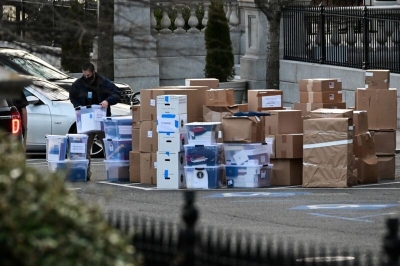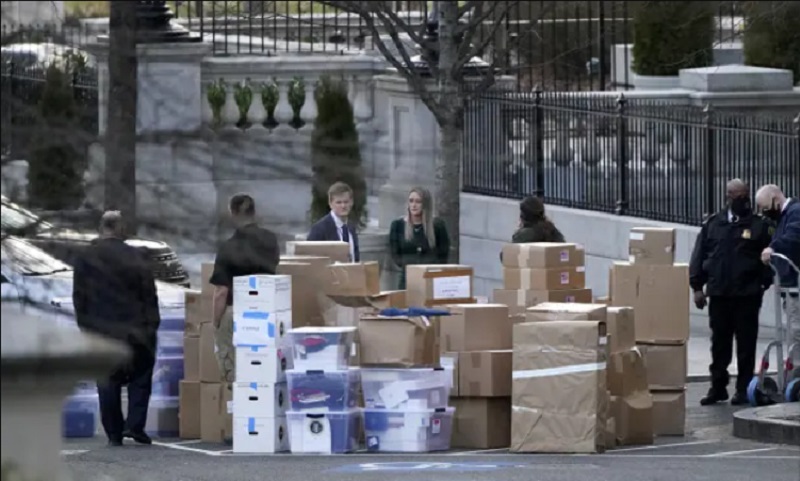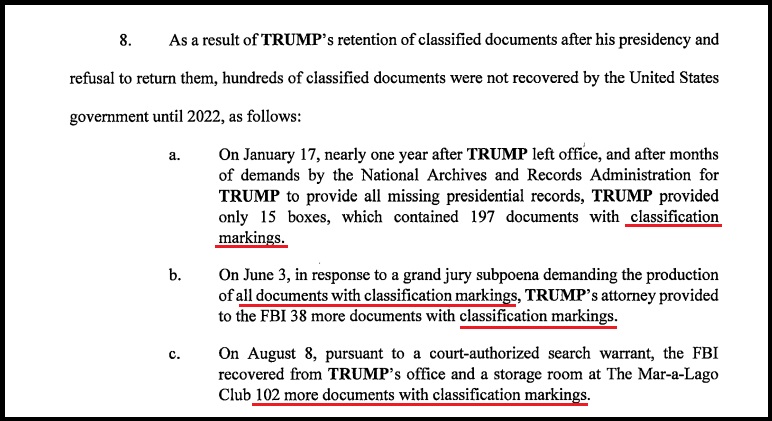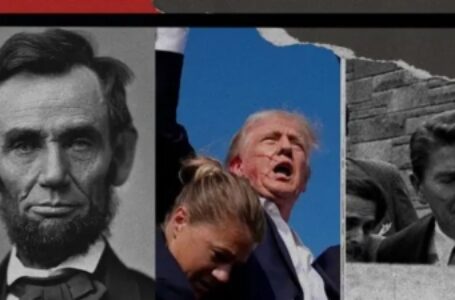Sunday Talks – The Encapsulation

If the documents did not belong to President Donald J. Trump, then why did the government dump them in the parking lot of the White House and tell him to deal with them?
I have been reviewing interviews, looking at discussion, and some of them I will share in the next few articles. However, for a solid representation of the state of our current dynamic, as it relates to the targeting of President Donald J. Trump, this interview below is a solid outlook from the detractors.
CBS News legal analyst Rikki Klieman and CBS News investigative correspondent Catherine Herridge join “Face the Nation” to discuss what’s in the indictment — and what it means for Trump. [Transcript Here]
 Before getting to the video, it’s valuable to see Rikki Klieman representing the interpretation of the media outlook toward the indictment handed down by Special Counsel Jack Smith. It is also valuable to see CBS’s Catherine Herridge represent the defenders of the institutions, from the outside vulgarian personage of Trump.
Before getting to the video, it’s valuable to see Rikki Klieman representing the interpretation of the media outlook toward the indictment handed down by Special Counsel Jack Smith. It is also valuable to see CBS’s Catherine Herridge represent the defenders of the institutions, from the outside vulgarian personage of Trump.
Klieman buys the Lawfare narrative completely, including the framework of classified documents as opposed to documents containing classified markings. She sells the Lawfare outline as gospel and makes all assertions from that position. Herridge looks at how the bureaucracy responds to Trump, including how the institutions hold power of determination higher than a President of the United States.
As Bill Barr said emphatically earlier today, “The documents do not belong to Trump,” continuing with “The documents belong to the government who created them, not the man for whom they were created.” So sayeth the defender of the omnipotent Dept of Justice. This is where a sharp intellectual knife to cut through the chaff and countermeasures is needed, and notice no one brings up the visible and practical deconstruction point.
If the documents did not belong to President Donald J. Trump, then why did the government dump them in the parking lot of the White House and tell him to deal with them?
If the documents belonged to the government, and not to the man for whom they were created, then why did that same government give them to him and force him to take them to a location of his choosing? Can you see the obtuse argument fall apart when simple pragmatic questions are raised?
The institutions are presented, by the sellers of the Lawfare narrative, as higher than the authority of the President of the United States. This is how ridiculous our government has become.
Institutions are not omnipotent entities; they are buildings and networks full of people who facilitate processes that are an outcome of policy. Those buildings and offices are not the government. The elected politicians who we send to Washington DC are not subservient to the processes, norms and morays they determine within the bureaucracy that the politicians are in charge of.
The argument(s) against Donald Trump are akin to a business saying that all work product created during the tenure of employment belongs to the enterprise of the business and not to the employee. If you want to hold that line of thought, fine. However, you then need to reconcile that the business enterprise intentionally gave all the work product to the employee, dumped it in their lap, told them to take it and leave, and then comes back at a later date and says – we now need to review the stuff we forced you to take because some of it might not actually belong to you.
Does this happen anywhere else? Of course not.
The fact that the National Archives and Record Administration refused to take custody of the documents upon the end of the White House tenure, combined with the fact the NARA dumped those documents in the parking lot of the White House for Trump to deal with, is a direct statement the bureaucracy was telling President Trump these are your records. His records – not their records on loan to him.
The Presidential Records Act is the overriding legislative guidance for the flow of work product post term in office. These are essentially document arguments. The fact that NARA together with the Biden administration would weaponize the disposition of documents, they intentionally forced Trump to take ownership of, speaks to an intent within the bureaucracy that is transparently obvious.
Bill Barr’s entire mindset is based on a belief the institutions are of a higher power than the individuals we elect to control them. In essence, the President of the United States is subservient to the bureaucracy. This is nonsense. This is also why former AG Bill Barr was more concerned about preserving the institutions than stopping the weaponizing activity that flows from them.
President Trump could store his “presidential records” anywhere he wants to; they are his records.
Now, watch Klieman obscure the difference between classified documents and documents containing classified markings. Despite her pontifications to the contrary, the indictment is not based around any classified documents. The classification of the documents is technically and factually moot to the ridiculous point the special counsel is making.
.
[Transcript] -JOHN DICKERSON: For more on the legal implications, we’re joined by senior investigative correspondent Catherine Herridge and CBS News legal analyst Rikki Klieman.
Rikki, I want to start with you.
You have been a prosecutor and a defense lawyer. So what stands out to you, now that you have read this indictment?
RIKKI KLIEMAN: I think what stands out, obviously, is the magnitude of detail in this indictment.
It’s not only that you’re dealing with 31 counts under the Espionage Act, which simply means the unlawful, willing retention of classified information, or even unclassified information that would hurt the defense of the United States and aid our enemies. It’s the detail of a speaking indictment.
We have to remember that much of this indictment, John, is to educate not only ultimately a court and jury, but it’s really to educate the public. Much of this indictment, in terms of the detail, may not even come into evidence, in terms of what’s admissible or not in the course of a trial.
What also strikes me, John, is, the overwhelming detail leaves the Trump legal team with real need to have powerful motions to dismiss, because, if this goes to trial, the way it reads, it’s rather overwhelming for anyone to be able to fight it on the facts themselves.
JOHN DICKERSON: And I want to get to that motion-to-dismiss question in a moment.
But, Catherine, you have been doing reporting about the risk assessment about just what was in these documents. Educate us on that.
CATHERINE HERRIDGE: Well, what jumps out to me, John, is when you go to the section the willful retention of national defense information, by my count, there are 21 top secret documents, and the disclosure of top secret information has the expectation of exceptionally grave damage to national security.
But what out — stands out to me is some of the classified codings, like TK, or Talent Keyhole. You don’t see that very often. That’s about intelligence from overhead imagery. For example, if we’re looking at a terrorist target, do we have such good visibility that we can count the hairs on their head? Can we see what they’re eating for breakfast on their terrorist patio?
Those are capabilities that we don’t want our adversaries to know that we have. And then also Special Access Programs, or SAP, these are highly restricted programs because of the sensitivity of the intelligence and the technology, such as stealth technology, for example.
Think of classified information like the Pentagon. Special Access Programs are these handful of rooms where there are just a limited number of keys to control and restrict access to that information.
JOHN DICKERSON: So it’s not just secret; it’s the top of the — top of the top?
CATHERINE HERRIDGE: Some of these are way beyond top secret, like, I said, Talent Keyhole, when you’re talking about Special Access Programs or SCI, sensitive, compartmentalized information.
These really are the crown jewels of the U.S. intelligence community.
JOHN DICKERSON: Rikki, let me ask you about a part of this indictment which seems to come — which comes from one of the former president’s lawyers.
Educate us on the crime-fraud exception, how it’s possible for a prosecutor to have this information. And is that a weakness? Because we know, from our reporting, that this is something that the Trump defense team is going to talk about, is the behavior of the prosecutors.
RIKKI KLIEMAN: We all believe that, when you go to a doctor, that there’s a privilege, that what you say and what your ailments are will remain confidential.
Same thing if you go to a clergyperson. And it’s exactly the same thing. When you go to a lawyer. You believe that, if you are a client, that what you say will never be disclosed to anyone, let alone in the grand jury or court of law. It’s called the attorney-client privilege. It protects all conversations relating to legal advice.
So, how did it get broken? That is, how did a court in Washington, D.C., a judge, and then an appellate court affirm the idea that you could hear, listen, read the notes and the voice memos of a lawyer to testify against his own client?
It’s called the crime-fraud exception. So what the court believed was, the conversations between Evan Corcoran, the lawyer, and Donald Trump were really in furtherance of a crime or a fraud, and he was ordered and forced to testify.
Now, one could say, well, that’s one and done. So now Mr. Corcoran is going to be a witness in this case, should it go to trial. But we have to remember that that took place, that decision, in the District of Columbia. Now we are in Florida. So can it come up to a new judge? Might a new judge decide that it is not admissible at trial? Yes.
Will that hurt the case? Not necessarily. There’s plenty of other evidence.
JOHN DICKERSON: Catherine, I have got two questions for you.
The first is, what happens if you’re just a regular old Joe and you have this kind of information? Legally, what happens to you? What’s happened?
CATHERINE HERRIDGE: Well, as one example, I have contacts who work in the nuclear weapons capability arena.
Let’s say you have a nuclear document, it’s on top of the photocopier, and you walk away, you leave it there. Your clearance is gone. You are out the door. There are immediate consequences.
JOHN DICKERSON: Let me ask you about a number of the president’s defenders.
Well, first of all, we should note, the current president is under investigation by a special counsel.
CATHERINE HERRIDGE: Correct.
JOHN DICKERSON: We don’t know much about that. But Republicans have brought that up in defending the president. They have also brought the case of Hillary Clinton.
You have been looking at that. Give us a sense of the apples and oranges or apples and apples in comparison with what’s on the table here.
CATHERINE HERRIDGE: Well, what strikes me, John, in this indictment is I think the special counsel, Jack Smith, specifically charged willful retention of national defense information in an effort to sort of blunt criticism that these cases may be the same.
If you go back to the summer of 2016, then-FBI Director James Comey said that they found multiple e-mail chains on Hillary Clinton’s private server that she used for government business that contained highly classified information, including these Special Access Programs that we just discussed, but, in his view, it should not be charged because he didn’t feel there was sufficient evidence of intent or willfulness.
Critics would say that even just purchasing the server was an example of intent. And then, finally, you have to look at just the scope of the information and also the timeline. But I think this charging of willful retention really is by design.
JOHN DICKERSON: Right, the facts of the case quite different. But thank you so much for that and for all your other answers.
And, Rikki Klieman, thank you.
And Face the Nation will be back in one minute. Stay with us. (link)
.



















